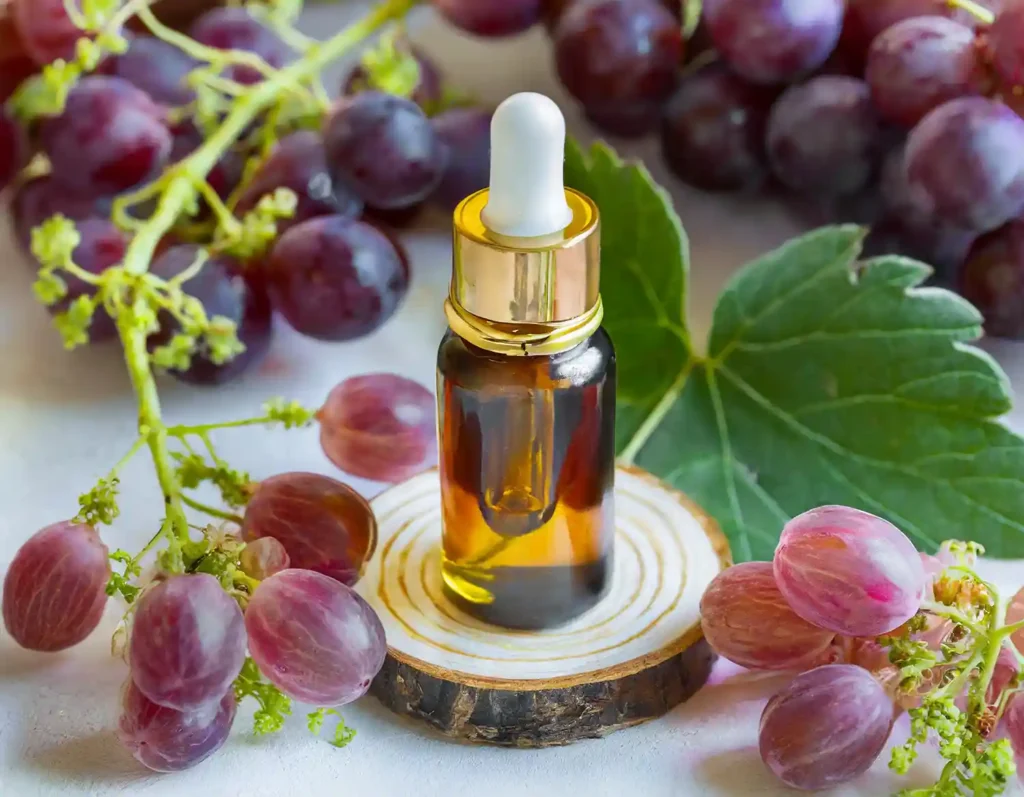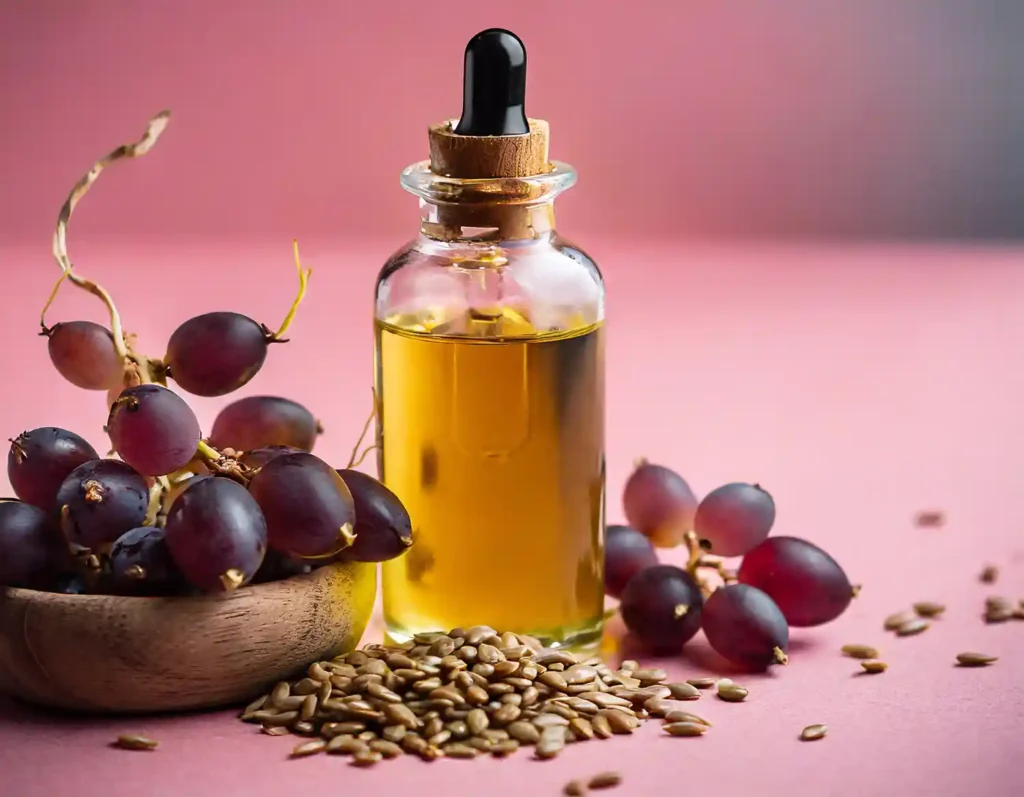Grapeseed oil, a byproduct of winemaking, has emerged as a versatile and beneficial oil for aromatherapy, health, and beauty benefits. Extracted from the seeds of grapes after the winemaking process, this oil has gained popularity for its unique properties and uses.
What is Grapeseed Oil?
Grapeseed oil is derived from the seeds of grapes, a fruit better known for its role in wine production. After grapes are pressed for wine, the seeds are left behind, often discarded as waste.
However, these grape seeds contain oil that can be extracted using various methods. The result is a light, versatile oil that has found its way into kitchens and beauty cabinets.
From Vineyards to Your Home: The Journey of Grapeseed Oil
The journey of grapeseed oil from vineyards to your home is a fascinating one. Initially considered a byproduct of the winemaking process, grapeseed oil has now carved out its own niche.
The extraction process involves either cold-pressing or using chemical solvents, with cold-pressed oil being the preferred choice for its quality and purity.
Grapeseed Oil Extraction
The extraction process can influence the health benefits of grapeseed oil. Cold-pressed grapeseed oil is preferred over oil extracted using chemical solvents like hexane, which can leave harmful residues. Cold-pressed oils retain more nutrients and are generally considered healthier.


The Benefits of Grapeseed Oil
Grapeseed oil is a treasure trove of potential health benefits. Rich in nutrients and antioxidants, it offers several advantages for your overall well-being.
A Heart-Healthy Choice: The Role of Omega-6 Fatty Acids
One of the most significant benefits of grapeseed oil is its high content of omega-6 polyunsaturated fatty acids, particularly linoleic acid.
These polyunsaturated fats are known for their potential health benefits. They may help reduce cholesterol levels and improve cardiovascular health when used in moderation and as a replacement for saturated fats.
Balancing Omega-6 and Omega-3 Fatty Acids
While grapeseed oil is rich in omega-6 fatty acids, it’s important to balance these with omega-3 fatty acids in your diet. Including various oils and foods rich in omega-3 fatty acids, like fish and flaxseeds, can help maintain this balance.
Vitamin E: A Powerhouse Antioxidant in Grapeseed Oil
Grapeseed oil is an excellent source of vitamin E, a fat-soluble antioxidant. It’s worth noting that grapeseed oil has a higher vitamin E content compared to other natural oils, such as olive oil.
Vitamin E is crucial in protecting the body’s cells from damage caused by free radicals, which are linked to chronic diseases and ageing. The high vitamin E content in grapeseed oil not only helps to support immune function but may also aid in maintaining healthy skin and eyes.


Grapeseed Oil Benefits for Skin and Hair Care
Grapeseed oil is a natural beauty enhancer, and its unique properties make it an excellent choice for skin and hair care routines.
Grapeseed Oil for Skin – A Natural Beauty Enhancer
Grapeseed oil is highly regarded in the beauty industry for its moisturising and nourishing properties.
Rich in Vitamin E and omega-6 fatty acids, it may help improve skin elasticity and skin tone and may reduce the appearance of fine lines and wrinkles.
Its anti-inflammatory properties also make it beneficial for oily skin and acne-prone skin. Grapeseed oil also possesses antimicrobial properties, which may aid in clearing and preventing acne.
The oil is light and easily absorbed, making it suitable for all skin types without leaving a greasy residue or clogged pores.
Moisturising and Anti-Ageing Effects
The hydrating properties of grapeseed oil make it an excellent moisturiser that may help soothe dry skin. Distinct from other vegetable oils such as coconut oil, grapeseed oil is non-comedogenic and doesn’t clog pores, making it suitable for even the most sensitive skin types.
Its antioxidant content helps protect the skin from environmental stressors, resulting in an even skin tone.
How to Use Grapeseed Oil for Skin Tone
Grapeseed oil may be used as a daily moisturiser, applied directly to the skin, or blended with a few drops of your favourite essential oil for added benefits. It’s also effective as a makeup remover or a base for exfoliating scrubs to remove dead skin cells on sensitive skin.
Transform Your Hair with Grapeseed Oil
For hair care, grapeseed oil is a hidden gem. It may help moisturise the scalp, reduce dandruff, and improve overall hair health.
Unlike other oils, such as olive oil and coconut oil, which can leave the hair feeling greasy after use, the lightweight nature of grapeseed oil makes it an excellent choice for a natural hair serum, offering shine and moisture without weighing hair down.
Benefits for Hair and Scalp Health
Grapeseed oil adds moisture to the hair, enhancing its strength and shine without leaving a greasy residue. The oil may potentially strengthen hair by improving overall scalp health due to its high linoleic acid content and antioxidants.
Application Tips for Optimal Results
Apply grapeseed oil to the scalp and hair as a deep conditioning treatment before shampooing, or use a small amount as a serum on damp hair to control frizz and add shine.
Incorporating grapeseed oil into your skin and hair care regimen may offer natural, effective, and versatile solutions for enhancing beauty and maintaining healthy skin and hair.
Grapeseed Oil in Aromatherapy
In aromatherapy, grapeseed oil is often used as a vegetable oil carrier. Its light texture and mild aroma make it an excellent medium for essential oils, enhancing their therapeutic properties without overpowering them. It’s easily absorbed by the skin, making it ideal for massage oil blends, promoting relaxation and skin health.


Precautions and Considerations
While grapeseed oil offers numerous benefits, it’s important to be aware of certain precautions and considerations to ensure its safe and effective use.
Understanding Potential Allergies and Side Effects
Although rare, some individuals may experience allergic reactions to grapeseed oil, especially those with a known allergy to grapes. Symptoms can include skin rashes, itching, or swelling. Conducting a patch test before using the grape seed oil topically is always advisable.
If in doubt, please get in touch with an IFA-qualified aromatherapist.
Choosing the Right Grapeseed Oil: Quality Matters
The quality of grapeseed oil is crucial for maximising its benefits. Opt for cold-pressed or expeller-pressed grapeseed oil, as these methods avoid the use of chemical solvents and preserve the oil’s nutritional properties.
It’s also important to check for purity and absence of additives. Storing the oil in a cool, dark place can help maintain its freshness and prevent rancidity.
By being mindful of these precautions and considerations, you can safely incorporate grapeseed oil into your skincare routine, reaping its full benefits.
Conclusion – A Step Towards Natural Wellness
Grapeseed oil is a remarkable natural product that offers a wide range of benefits as a carrier oil in aromatherapy and beauty. Its versatility and efficacy make it a valuable addition to daily life.
Incorporating grapeseed oil into your lifestyle can be a simple yet effective step towards embracing a more natural and holistic approach to health and beauty. Whether used as part of your skincare routine or in other creative ways, organic grapeseed oil has numerous advantages.
In conclusion, grapeseed oil is more than just a byproduct of winemaking; it’s a multifaceted oil that enriches our lives in various ways. Its unique blend of health benefits, beauty applications, and other uses makes it a noteworthy and valuable addition to anyone’s beauty cabinet.






